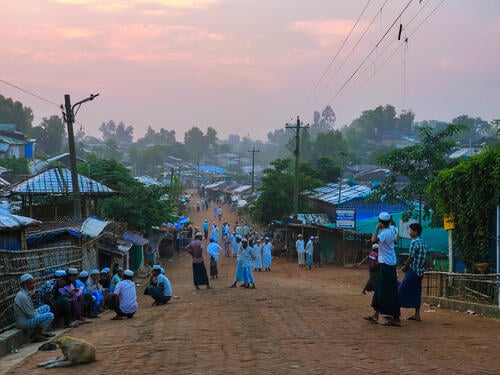- In the past week MSF staff in Cox’s Bazar, Bangladesh, have treated a number of war wounded Rohingya people who crossed the border from Myanmar in search of safety.
- Mortar shell injuries and gun shot wounds indicate the worsening humanitarian situation for the Rohingya in Rakhine state.
- Civilians caught up in the ongoing conflict in Rakhine state must be protected.
Dhaka, Bangladesh – Escalating numbers of Rohingya people with violence-related injuries have crossed the border into Bangladesh over the past week, indicating the worsening humanitarian crisis in Myanmar’s Rakhine state. Civilians caught up in the conflict must be protected.
In the four days leading up to 7 August, Médecins Sans Frontières (MSF) teams in Cox’s Bazar, Bangladesh, treated 39 people for violence-related injuries. More than 40 per cent were women and children. Many had mortar shell injuries and gunshot wounds. Numbers peaked on 6 August when our teams treated 21 wounded people. MSF staff at the clinic say this is the first time in a year that they have seen serious injuries on this scale.
“Considering the rise in the number of wounded Rohingya patients crossing from Myanmar in recent days, and the nature of the injuries our teams are treating, we are becoming increasingly concerned about the impact of the conflict on Rohingya people,” says Orla Murphy, MSF’s country representative in Bangladesh. “It is clear that safe space for civilians in Myanmar is shrinking more each day, with people caught up in the ongoing fighting and forced to make perilous journeys to Bangladesh to seek safety.”
It is clear that safe space for civilians in Myanmar is shrinking more each day.Orla Murphy, country representative in Bangladesh
Patients have described the desperate situation in Rakhine state to MSF staff. Some reported seeing people bombed while trying to find boats to cross the river into Bangladesh and escape the violence. Others described seeing hundreds of dead bodies on the riverbanks. Many patients spoke of being separated from their families en route to safer areas and of loved ones being killed in the violence. Many people said they were fearful that family members remaining in Myanmar would not survive.
Conflict has been escalating in Rakhine state since October 2023, causing immense suffering to Rohingya communities and crippling the healthcare system.
“Our patients tell us that they faced extreme difficulties in accessing medical facilities in Myanmar due to the highly volatile situation there,” says Murphy.
The conflict has also impacted our ability to run medical activities safely. In June, MSF was forced to suspend our services in northern Rakhine state because of the violence, depriving people of vital medical care and further deepening the humanitarian crisis.
We call for the immediate protection of civilians caught up in the conflict.
“People must not come under indiscriminate attack and should be allowed to leave for safer areas, while all those in need of vital medical care should have unhindered and sustained access to medical facilities,” says Murphy.



